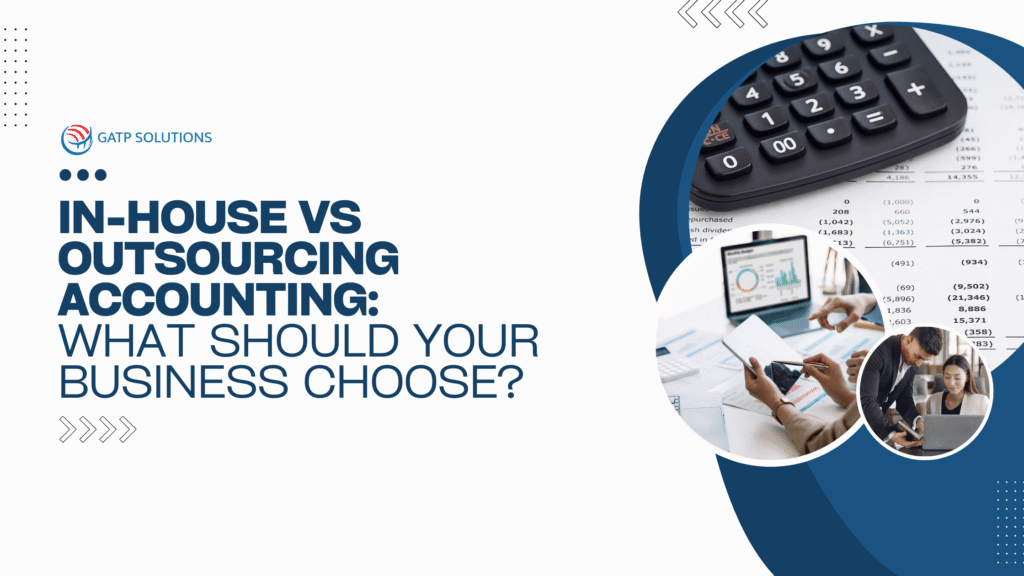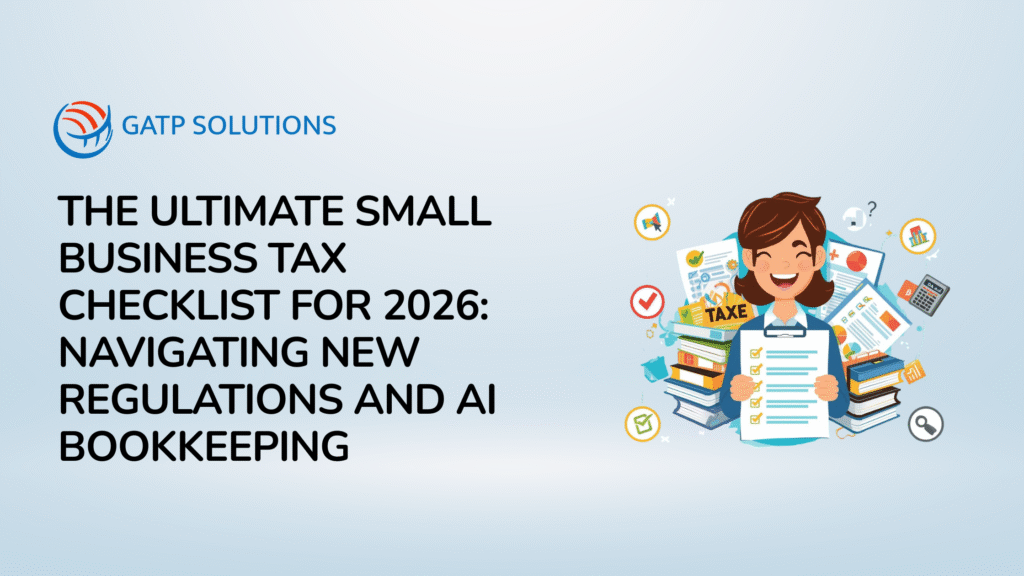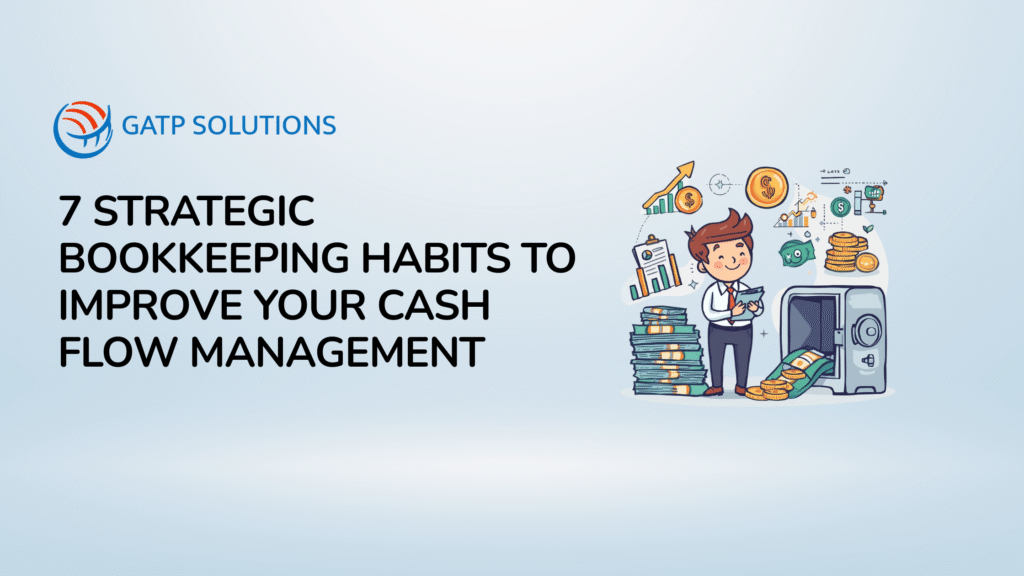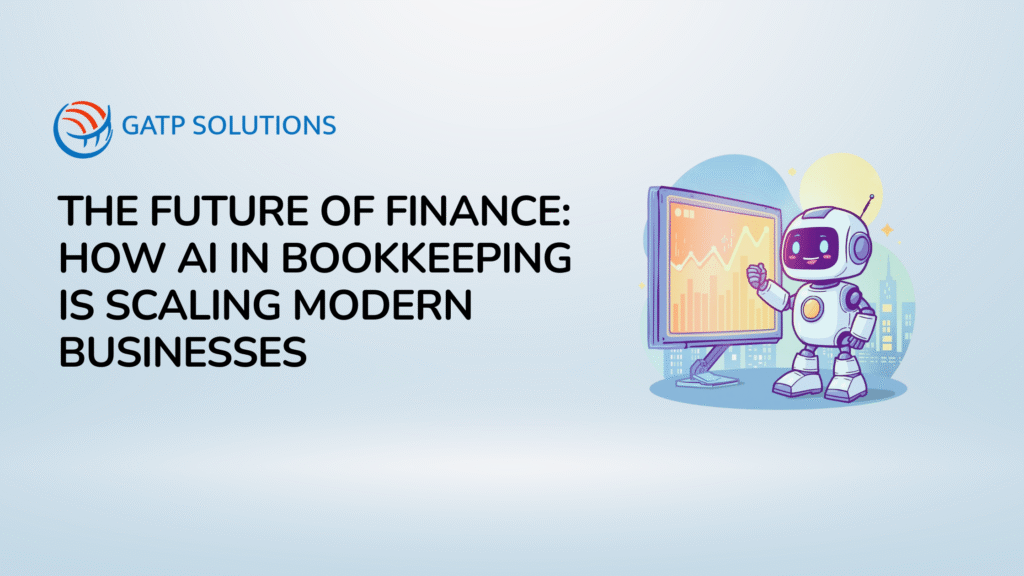Every founder or finance lead at some point thinks of the question: Is in-house accounting enough, or do we need to outsource?
This usually comes up when the business starts to grow with more clients, more transactions, and more reporting requirements. With the business growth, the deadlines become tighter, accuracy becomes more important, and small mistakes cost a lot to the business altogether.
In such cases, you need to decide whether to continue with the same process or whether outsourcing accounting would be a better option. Now, outsourcing accounting is not just about saving costs. It is about better control, having expertise, room for scalability, and the ability to get the right insights for faster business decisions.
In this blog, we will understand the difference between in-house and outsourced accounting, what each of them offers to your business, and how to decide which one fits better at the stage of your business’s growth.
Difference between In-House Accounting and Outsourcing Accounting
For a business’s financial management, you have two options to consider: One is to hire in-house accountants and manage the accounting internally, and the second is to outsource accounting to another firm for more expertise. By understanding the difference between the two, you will be able to make better decisions for the organization.
In-House Accounting
In-house accounting consists of hiring a full-time accounting team that works internally to manage the company’s accounts. This provides your company with real-time collaboration, more control and access to the data, and a deeper understanding of the internal processes of your financial processes.
However, the in-house accounting comes with fixed costs like salaries, benefits, office infrastructure, and limited flexibility to scale as per the business requirements and growth.
Outsourcing Accounting
Outsourcing Accounting means outsourcing the accounting work to an external firm. This can include bookkeeping, payroll, tax preparation, and financial reporting. Outsourced teams provide your organization with better industry experience, usage of specialized software, and delivery of standardized outputs. This usually comes with higher accuracy and lower costs to the company.
The following is a quick comparison:
| Criteria | In-House Accounting | Outsourcing Accounting |
| Cost | High (salaries, overhead) | Variable (based on usage) |
| Expertise | Limited to internal hires | Access to specialists |
| Scalability | Slower | Fast and flexible |
| Compliance | Depends on the team’s knowledge | Handled by trained professionals |
| Technology | Requires in-house adoption | Provided by vendor |
Why Outsourced Accounting for Startups Makes Business Sense
Startups have a dynamic and lean working environment. Every startup has a lot of unpredictability and room for growth. Hence, hiring a full-time accountant early on or having a full-time finance team in the early stages may burden the budget and slow things down for your startup. Hence, outsourced accounting for startups has become the preferred model in the business world.
Startups nowadays require the following:
- Real-time financial visibility
- Clean books for fundraising
- Error-free compliance
- Forecasting models to support quick decisions
An outsourced accounting for startups provides these without the stress of internal hires. With virtual CFO services, cloud-based tools, and task-specific experts, you can focus on your startup’s growth operations while the experienced professionals manage your business numbers.
As accounting service providers understand the startup realities and requirements, they provide you with flexible contracts and the option to increase services as per your business growth.
When Outsourcing Accounting Services for Small Businesses is the Right Move
Small businesses often operate without any dedicated finance teams or accountants. The owners manage operations, marketing, and finance until the books fall behind or the tax season arrives. This creates a big chaos for you as there would be no proper record or documentation to manage such situations.
This is where outsourcing accounting services for small businesses proves to be a practical and beneficial decision. The following are the benefits of outsourcing accounting services for small businesses:
- Timely tax filings and regulatory compliance
- Reconciled accounts and clean audit trails
- Cash flow insights that support operational decisions
It is also a smart financial move as a small business owner, as by outsourcing accounting services, you pay only for what you use. Additionally, accounting service providers bring automation into the process, which reduces manual errors and turnaround times.
Types of Outsourced Bookkeeping Services You Can Use
Bookkeeping is the backbone of every finance function in every organization. However, not all businesses require the same level of accounting services. The following are outsourced bookkeeping services you can explore:
- Basic Bookkeeping
Transaction categorization, ledger entries, and bank reconciliation.
- Payroll Processing
Managing employee salaries, tax deductions, and payslip generation.
- Accounts Payable and Receivable
Tracking invoices, vendor payments, and collections.
- Financial Reporting
Monthly/quarterly statements, balance sheets, and P&L reports.
- Compliance Support
Sales tax, GST, or state-specific filings, depending on geography.
By outsourcing the bookkeeping services, you can easily focus on operational tasks while ensuring that your company’s financial backend is organized and audit-ready.
Most firms, including GATP Solutions, use cloud software like QuickBooks, NetSuite, or Xero, which gives you real-time access and control, even if the work is done off-site.
Which Accounting Service Model is Right for Your Business?
To decide between in-house accounting and outsourcing accounting, consider these questions:
- Do you need real-time, on-site collaboration?
- Are your financial needs complex and constant?
- Can you afford the overhead of a full finance department?
- Are you looking for flexibility, scale, and reduced risk?
Choose in-house accounting if:
- Your company operates in a highly regulated industry that requires full-time oversight.
- You already have a strong team and want to deepen institutional knowledge.
Choose outsourcing accounting if:
- You’re in a growth phase and need scalable support.
- You want access to expertise and automation without long-term hiring.
- You need compliance across multiple jurisdictions (US, CA, AU).
In some cases, a hybrid approach works well: outsource transactional tasks and keep strategic roles in-house.
How GATP Solutions Simplifies Outsourcing Accounting
At GATP Solutions, we specialize in helping mid-sized businesses and growing startups navigate the decision to outsource accounting. We understand that each business is at a different growth stage, and that financial clarity is non-negotiable.
Our outsourcing accounting services are designed for industries like e-commerce, real estate, and professional services. We don’t just manage numbers. We automate them. From AP/AR automation to payroll integration and compliance checks, GATP builds an ecosystem that supports scalability.
We also cater to specific needs such as:
- Outsourced accounting for startups: CFO support, reporting for fundraising
- Outsourcing accounting services for small businesses: transaction management, payroll, reporting
- Outsourced bookkeeping services: customized workflows based on the tools and systems you already use
Our teams are trained in Canadian, US, and Australian accounting regulations. So you are not just outsourcing, but you are expanding your capability across borders.
Conclusion
The decision between in-house accounting and outsourcing accounting is less about which one is better and more about which suits your requirements better. Your startup may benefit from the flexibility and strategic insights for growth and presentation. And if you are a small business owner, your business will have fewer financial risks and better accounting management throughout the year.
With a partner like GATP Solutions, outsourced bookkeeping services are no longer just a support function to you, but become a business asset. Your accounting setup should simplify and support your business growth, not complicate it. If it is not supportive, you need to rethink about your company’s accounting management.
Frequently Asked Questions
- What is the difference between in-house and outsourcing accounting?
In-house accounting involves hiring and managing a finance team internally. Outsourcing accounting means handing over financial tasks to an external provider with expertise, systems, and tools in place. The key differences lie in cost structure, scalability, and access to specialized talent.
- Is outsourcing accounting a good option for growing businesses?
Yes. Outsourcing accounting is often more efficient and cost-effective for growing businesses. It provides access to experienced professionals, automation tools, and timely reporting without the overhead of managing a full in-house team.
- How does outsourcing accounting help with compliance and accuracy?
When you choose outsourcing accounting, your financial data is handled by trained professionals who stay updated on local and international compliance standards. This helps reduce errors, avoid penalties, and improve reporting accuracy.
- What types of accounting tasks can be outsourced?
Businesses can outsource a wide range of tasks including bookkeeping, payroll processing, accounts payable and receivable, financial reporting, and tax preparation. At GATP Solutions, these services are customized to suit your tools, industry, and reporting requirements.
- Can outsourcing accounting support startups and early-stage companies?
Absolutely. Many startups benefit from outsourcing accounting early on to manage fundraising reports, cash flow planning, and day-to-day bookkeeping. GATP Solutions offers outsourced CFO support, startup-ready financial systems, and investor-grade reporting for growing teams.
- What should I look for in an outsourced accounting provider?
Look for a provider with industry experience, knowledge of your market’s regulations, and a structured process for communication and reporting. GATP Solutions supports businesses in the US, Canada, and Australia with tailored, automated, and compliant accounting services.
- How do costs compare between in-house and outsourcing accounting?
In-house accounting typically includes fixed costs like salaries, software, and office space. Outsourcing accounting often comes at a lower variable cost, with access to higher expertise and infrastructure included. This makes it easier to scale or adjust based on business needs.




